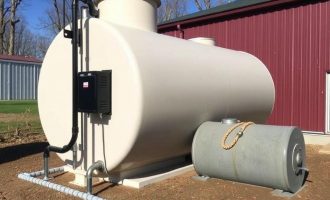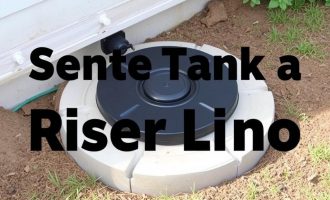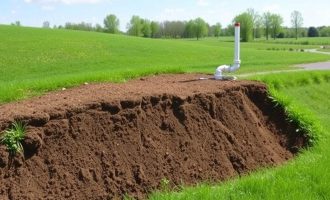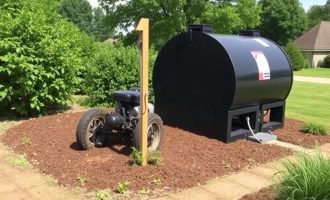Your septic system is a critical component of your home’s sanitation infrastructure, quietly working behind the scenes to treat wastewater and keep your property healthy. However, many homeowners don’t realize just how vulnerable these systems are to damage and failure from overloading. Overloading your septic system can lead to costly repairs, unpleasant odors, health risks, and environmental contamination. Understanding how to avoid overloading your septic system is essential to preserving its longevity and functionality.
In this comprehensive guide, we’ll walk you through everything you need to know—from identifying what causes septic system overload, to practical steps you can take to reduce strain, maintain proper usage, and protect your investment for the long haul.
- What Is a Septic System and Why It Matters
- Common Causes of Septic System Overload
- 1. Excessive Water Usage
- 2. Improper Disposal of Waste Material
- 3. Poor Maintenance and Neglect
- 4. Heavy Rain and Flooding
- Signs You Might Be Overloading Your Septic System
- How to Avoid Overloading Your Septic System: Practical Tips and Best Practices
- Manage Your Water Usage Wisely
- Be Mindful of What You Flush and Pour
- Maintain Your Septic System Regularly
- Manage Outdoor Water Flow Carefully
- Additional Tools and Technologies to Help Prevent Septic System Overload
- How to Respond If You Suspect Your Septic System Is Overloaded
- Common Myths About Septic System Overload
- Checklist: To Avoid Overloading Your Septic System
- The Environmental Impact of Septic System Overload
- Summary: How to Ensure Your Septic System Lasts a Lifetime
- Remember:
- Conclusion
What Is a Septic System and Why It Matters
Before diving into how to avoid overloading your septic system, it’s important to know what exactly a septic system is and how it functions. Simply put, a septic system is an underground wastewater treatment structure commonly used in rural areas or homes not connected to centralized sewer lines. The system collects wastewater from your household plumbing, treating it naturally through a combination of biological processes and soil filtration.
At its core, a septic system consists of three main parts:
- Septic Tank: The large underground container where solids settle and begin breaking down.
- Drain Field (Leach Field): The area where liquid effluent is dispersed and filtered through the soil.
- Soil Layer: Acts as the natural filter, removing harmful bacteria, viruses, and nutrients from the wastewater.
When your system is working properly, it protects your family and the environment by safely processing household waste. However, every septic system is designed to handle a certain volume of wastewater. Overloading it can disrupt the treatment process and cause serious problems.
Common Causes of Septic System Overload
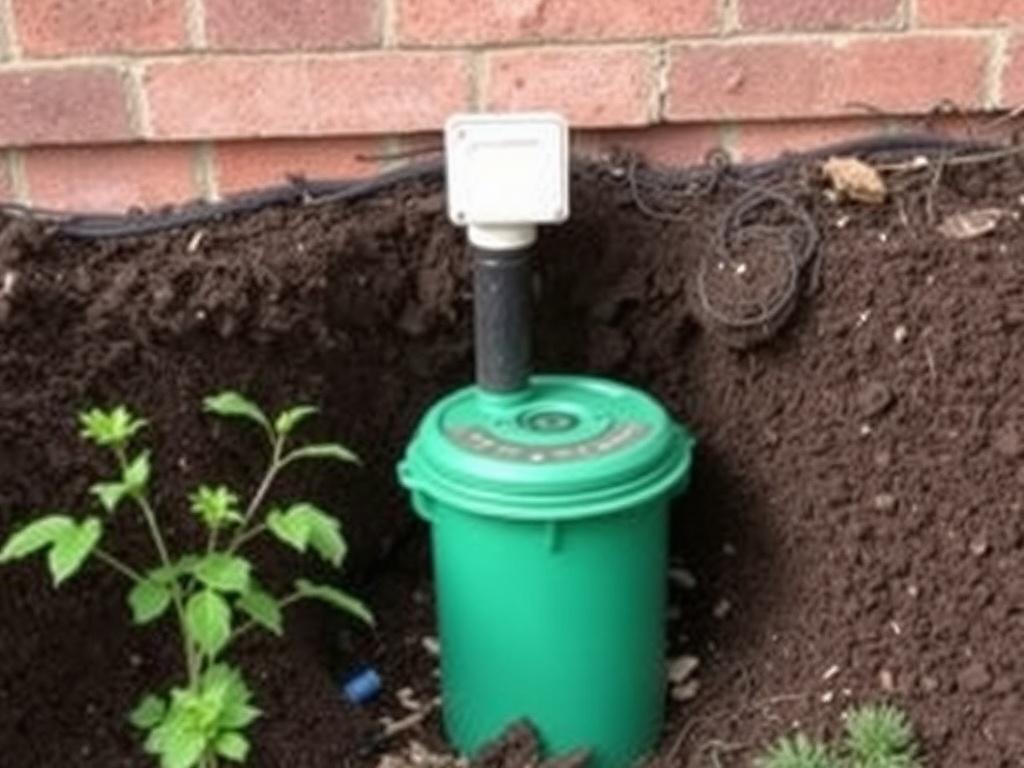
Understanding what leads to septic system overload is half the battle. By identifying these causes, you can prevent unnecessary stress on your system and extend its functional life. Here are some of the most frequent reasons septic systems become overloaded:
1. Excessive Water Usage
One of the main culprits behind septic overloading is using more water than the system can process. This often happens due to poor water management habits such as running multiple large loads of laundry consecutively, long showers, or frequently filling up pools. Excessive water rushing into the septic tank reduces the time solids have to settle and pushes untreated wastewater into the drain field.
2. Improper Disposal of Waste Material
What you flush down your toilets or pour down your drains matters a lot. Flushing non-biodegradable items, grease, oils, chemicals, or even too much organic waste can clog or damage your system. These materials don’t break down easily, meaning they accumulate and restrict flow.
3. Poor Maintenance and Neglect
Failing to pump your septic tank regularly can cause solids to build up beyond capacity, increasing the risk of overload. Without routine inspections, small issues like minor blockages or leaks can grow and disrupt the system’s balance.
4. Heavy Rain and Flooding
Excess surface water from storms or flooding can saturate the drain field, making it unable to absorb effluent properly. This can cause wastewater to back up into your home.
Signs You Might Be Overloading Your Septic System
Knowing the warning signs of an overloaded septic system can help you catch problems early before they become catastrophic. Watch out for these common indicators:
- Slow Drains: Sinks, tubs, and toilets draining slowly may signal blockages or saturation.
- Gurgling Sounds: Strange noises coming from plumbing often point to air trapped due to flow problems.
- Pooling Water or Mud Around the Drain Field: This often indicates effluent is surfacing rather than being absorbed.
- Foul Odors: Unpleasant smells near your septic tank or drain field can be a clear sign of leakage or overflow.
- Backups Inside Your Home: Wastewater backing up into toilets or drains is an urgent sign of system failure.
How to Avoid Overloading Your Septic System: Practical Tips and Best Practices
Preventing septic system overload boils down to managing water flow, reducing harmful waste input, and maintaining your system properly. Let’s explore actionable strategies you can adopt today.
Manage Your Water Usage Wisely
Controlling water volume keeps your septic system balanced and efficient. Here are some smart water use tips:
- Space Out Laundry Loads: Instead of doing multiple loads back-to-back, spread them out to allow your tank to process wastewater adequately.
- Fix Leaks Promptly: A dripping faucet or running toilet can waste hundreds of gallons monthly, unnecessarily exhausting your system.
- Install Water-Efficient Fixtures: Low-flow toilets, showerheads, and faucets reduce water use without sacrificing performance.
- Reduce Shower Time: Cutting shower time by a few minutes a day can significantly decrease water input.
Be Mindful of What You Flush and Pour
Keep your septic system healthy by only flushing what naturally breaks down. Avoid flushing:
- Baby wipes, sanitary products, or paper towels
- Grease, oils, and fats
- Chemical cleaners, paints, or motor oils
- Excessive food waste
Instead, dispose of these materials through appropriate waste containers or special hazardous waste programs. Using septic-safe household products helps maintain the beneficial bacteria in your tank that break down waste.
Maintain Your Septic System Regularly
Routine care is key to avoiding overload and prolonging the life of your septic system:
- Schedule Regular Pumping: Most systems need pumping every three to five years, depending on use and size.
- Conduct Annual Inspections: A professional can check for leaks, cracks, or early signs of failure.
- Protect the Drain Field: Avoid parking vehicles, building structures, or planting large trees over the drain field as roots and compression damage pipes.
Manage Outdoor Water Flow Carefully
Keep rainwater and surface water away from your drain field:
- Ensure gutters and downspouts drain away from the septic area.
- Grade your yard to prevent water pooling near the system.
- Install drainage solutions if flooding is common on your property.
Additional Tools and Technologies to Help Prevent Septic System Overload
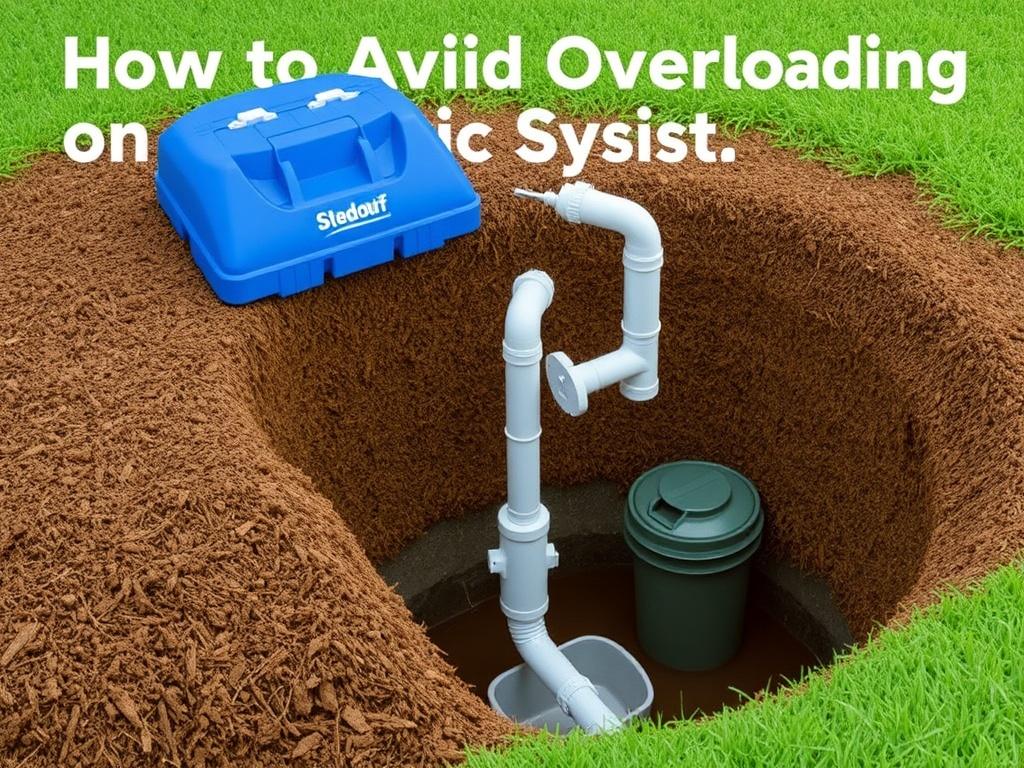
Advances in septic technology and home water management can further aid in protecting your system:
| Tool/Technology | Description | Benefits |
|---|---|---|
| Septic Tank Alarms | Devices that alert you when the tank is nearing capacity or a malfunction is detected. | Early warning prevents overload and reduces damage risk. |
| Effluent Filters | Filters installed at the tank outlet to catch solids before they enter the drain field. | Reduces clogging, prolongs drain field life. |
| Water-Efficient Appliances | Dishwashers, washing machines, and toilets designed to use less water. | Lowers water input load on the septic system. |
| Greywater Recycling Systems | Reuses water from sinks or showers for irrigation or flushing. | Reduces volume entering septic system. |
How to Respond If You Suspect Your Septic System Is Overloaded
If you notice signs of septic system strain, taking prompt action can save you money and inconvenience:
- Limit Water Usage Immediately: Reduce water flow to your system while assessing the situation.
- Stop Using Garbage Disposal: These can increase solids in the tank and worsen overload.
- Schedule a Professional Inspection: A septic service specialist can diagnose issues and recommend solutions.
- Arrange for Pumping or Repairs: Depending on the diagnosis, pumping solid waste or fixing damaged components may be necessary.
- Follow Professional Advice to Prevent Recurrence: Implement lifestyle or system changes as recommended.
Common Myths About Septic System Overload
Let’s clear up a few misunderstandings around septic overload that can mislead homeowners:
- Myth: Flushing bleach or strong chemicals cleans the system. In reality, harsh chemicals kill beneficial bacteria vital for breaking down waste.
- Myth: Septic systems never need maintenance if working fine. Even a seemingly well-functioning system requires regular care to prevent overload.
- Myth: Additives improve septic system performance. Commercial septic additives often don’t provide benefits and can sometimes harm your system.
Checklist: To Avoid Overloading Your Septic System
| Action | Why It Helps |
|---|---|
| Space out laundry and dishwashing | Prevents sudden overload of wastewater |
| Fix leaks and drips | Reduces unnecessary water flow into the system |
| Only flush human waste and toilet paper | Prevents clogs and harmful material build-up |
| Schedule septic tank pumping regularly | Removes solid buildup before it causes problems |
| Keep stormwater away from your drain field | Prevents soil saturation and system backup |
The Environmental Impact of Septic System Overload
Overloading your septic system doesn’t just cause inconvenience at home—it also poses real environmental threats. When septic systems fail, untreated or partially treated wastewater can seep into groundwater or nearby water bodies, spreading pollutants, bacteria, and nutrients that degrade water quality. This can harm aquatic life, contaminate drinking water sources, and contribute to the spread of waterborne illnesses. By properly managing your septic system and avoiding overload, you are doing your part to protect the environment and public health.
Summary: How to Ensure Your Septic System Lasts a Lifetime
Thinking of your septic system like an underground ecosystem helps. It needs balance, care, and respect to function effectively. Avoiding overload is crucial and involves managing water use, being cautious about the waste you flush, keeping up with maintenance, and protecting the surrounding landscape from excess water. Incorporating these habits into your daily routine will save you money, protect your health, and preserve the environment.
Remember:
- Septic systems have limits—don’t push them.
- Preventive care is always better than costly repairs.
- Professional help is invaluable when in doubt.
Follow these guidelines to keep your septic system running smoothly for decades to come.
Conclusion
Overloading your septic system is a serious concern that any homeowner with an on-site wastewater system should be aware of. By understanding what causes overload, recognizing the warning signs, and implementing practical measures like managing water use, being cautious about what goes down your drains, and maintaining your system regularly, you can avoid costly failures and environmental hazards. Protecting your septic system not only safeguards your health and home value but also contributes positively to the environment. Remember, small changes in everyday habits can make a significant difference. Keeping your septic system balanced is not just about avoiding problems—it’s about ensuring this essential system continues to serve your family efficiently and safely for years to come.
Помогла вам статья?


